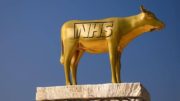There’s a good piece over at the Spectator by Kate Andrews who examines what former Bank of England Governor Lord Mervyn King said about Britain’s current financial predicament. Like many other Western nations Britain increased its money supply to pay for things like pandemic support which meant that there was a lot of money chasing too few goods during the pandemic and in the immediate aftermath. The result of this money printing has of course been inflation as Lord King said was something that was eminently predictable.
Ms Andrews quoted Lord King as saying:
I think all central banks in the west, interestingly, made the same mistake. And during Covid, when the economy was actually contracting because of lockdown, central banks decided it was a good time to print a lot of money. That was a mistake. That led to inflation. We had too much money chasing too few goods. And the result was inflation. That was predictable. It was predicted, and it happened. So that’s one problem we have to try to get out of. But the public finances both in the United States and the United Kingdom were not put on a sustainable track. And markets responded to that.
That Western governments were spooked by Covid is something that I believe many people will be able to understand. The problem is that the financial response to Covid including furlough and easily defraudable business continuity loans and grants funded by money printing has landed us with a lot of problems that might, had different decisions been taken, have been avoided. The situation was made worse by the economies of many Western nations still not being in a good condition because of the aftermath of the 2008 financial crash.
Printing money Weimar-style put additional pressures on an already shaky economic system and the results have not been good. I suspect that it will take time and a lot of trouble for ordinary people to put right the economic mistakes of the politicians and economists who’ve created this dire situation.






Don’t worry too much Sunak’s coronation is in a few days. Once firmly installed in a freshly redecorated 10 Downing Street he will set about taxing the lower classes at whatever level is required to balance the books. The next couple of years is going to be a great time to be rich.
It might be a great time to be rich but it’s going to be an awful time to be poor. The next few years might be when society and in particular the Left abandons identity politics and rediscovers the concepts of class conflict and interclass exploitation.
Taxing the poor is always the way government goes, it doesn’t upset their rich friends and associates. Also being poor they just don’t matter and there are so many more of them to tax.
Agree that taxing the poor is sometimes a win for a government but not always. The Poll Tax for example not only had widespread evasion but also politicised a generation of working class people who previously might have been ambivalent to politics. Also excessive taxation ends up causing people to find ways around it whether it be barter or buying cheaper counterfeit goods or cash in hand work or bathtub gin in response to high booze taxes. There is an optimum level of taxation that gets the most revenue but is not so high as to cause evasion
“…the financial response to Covid including furlough and easily defraudable business continuity loans and grants…” Doesn’t even need to be fraud – sheer incompetence will do just as well: A friend of mine ran a very small business based in rented space. He completed the application form for Covid relief honestly and correctly expecting to receive a few hundred pounds, and was amazed to receive a cheque for around £20,000! On investigation, the council appeared to have based the payout on the rateable value of the entire building. Point is – it was a council-owned building, so they knew perfectly well that he only rented a small section of it.